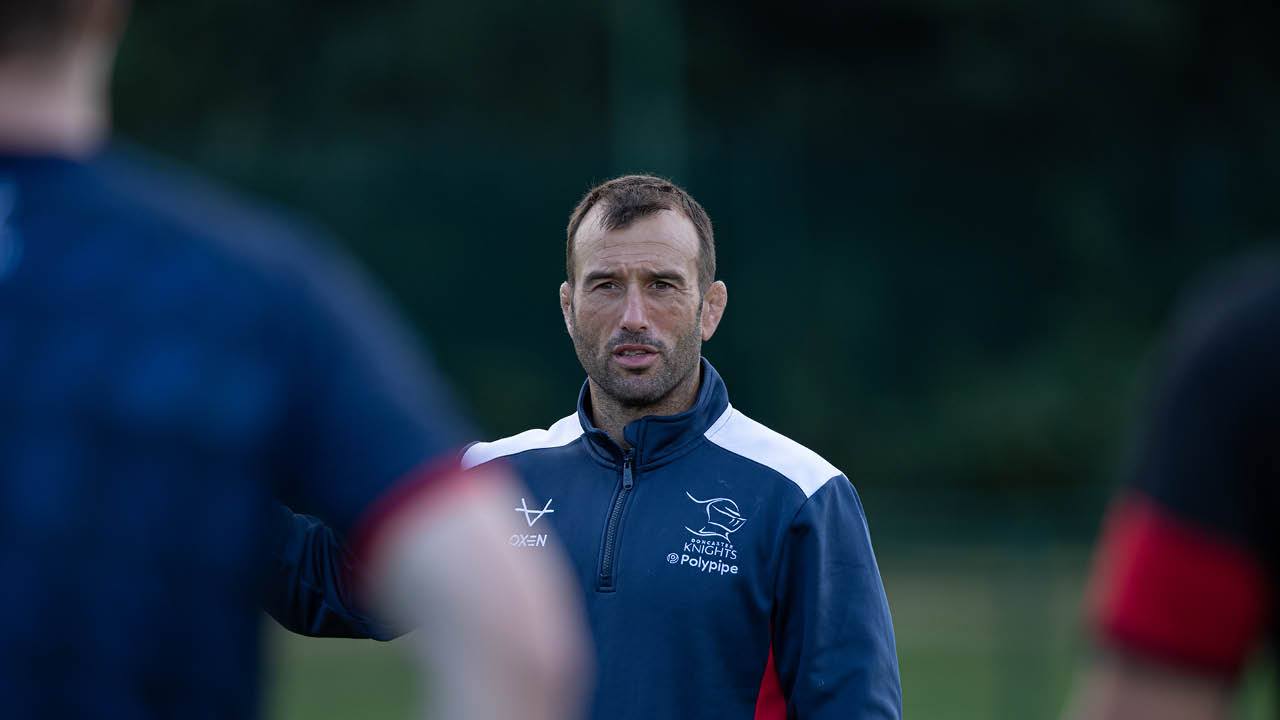Former hooker Steve Boden, now head coach of Doncaster Knights, talks about his love of the front row, his dream pack, his greatest scrum and why the scrum doesn’t get enough credit. He talks to Jon Newcombe for Rhino.Direct...

Steve Boden’s scrum life. A no-nonsense hooker, Boden started at Leeds when Stuart Lancaster was in charge of the academy before going on to make 188 appearances for Doncaster. His playing career ended and his senior coaching career started at Jersey Reds. Boden became forwards coach with the club and later moved to Yorkshire Carnegie in 2016 to become head coach and helped guide the Leeds side to a play-off final in his first season at Headingley. He replaced Clive Griffiths as head coach of the Knights in time for the start of the truncated 2020/21 season.
How did you end up in the front row?
“I was just too slow to play anywhere else! I played a lot of rugby league in youth rugby and then when I first went to rugby union, I played back row, centre and then moved up to the front row to play prop and then hooker which obviously meant a lot of time on the scrum machine. Hooker was a nice blend between prop and flanker and it suited my game, being fairly combative. I moved to hooker at 18 and I stuck with it.”
What did you like about playing there?
“Playing in the front row you are at close quarters and directly competing against your opposite number for large parts of the game. It becomes quite personal at times and being competitive by nature, I quite like that. I also love the togetherness of the forward pack.”
Is there one scrum that stands out?
”Probably one of the most dominant scrum performances we had was against Bristol away, at the Memorial Stadium. I’m showing my age now, but a young Mako Vunipola was playing for them. We destroyed them up front that day. Another was at Exeter when we drew 9-9 at Sandy Park. It was a hell of a game. We got a scrum penalty when we drove straight through them and Jamie Lennard kicked the penalty to draw the game. It was the only time I got a result against them down there and, to be fair, I think we were hardly done by because we should have got a penalty try.”
Was rugby coaching something you always wanted to do?
“Coaching is always something I have always been into, I did some coaching in amateur and youth rugby when I was still playing and really enjoyed it. I played quite a lot of rugby from a young age – I probably got to over 150 Championship games by the time I was 25 – and my body started breaking down a few years later. My passion for playing was starting to wane and my enthusiasm for coaching started to take over. That’s when I really started to think about rugby coaching as a possible career. So when I had to retire because of a neck injury and an opportunity came up to join the coaching team at Jersey, I took it with both hands. I’ve not looked back since.”
What’s the biggest challenge as a rugby coach?
“I don’t think people realise how hard coaches work. What I would say is if you’re going to get into coaching you have got to embrace the grind because the hours you put in are ridiculous. I say that but I love every minute.”
How important is to embrace ideas from other people?
“I am really open to people coming in and having a look at what we are doing and also going and having a look at what they are doing. We had Robin McBryde in this week. He is fresh back from a Lions tour and it was fantastic having him in. Sometimes you just pick up little snippets from other coaches and sometimes they coach something the same way but are clearer in the way that they put it across. The thing about coaching is you’ve got to self-educate as much as you. If you don’t then you are only telling people what you know which definitely isn’t infinite. It then becomes old news in a sense. There is no limit to what you know and you have to keep moving forward when delivering rugby training sessions.”
Best piece of advice given to you?
“My partner Emma’s dad works in professional football and he always tells me, as do older rugby coaches, ignore what other people are doing and don’t be in a rush to get to where you want to be. I get it now that I have been coaching the best part of 10 years. Some younger rugby coaches get obsessed by what others are doing. They may see someone get a job and think to themselves, ‘how has he got that move?’ You start taking your eye off the ball if you do that.”
What’s one of the big lessons you’ve learned?
“One thing I have got better at in the last four years is understanding how important it is to celebrate the moments or results that have gone well because they are soon forgotten and you soon have to move on to the next forwards training or rugby training session. Yorkshire Carnegie beating London Irish convincingly at home was one of those results.”
What gives you the most satisfaction as a rugby coach?
“Something I have taken great pride in throughout my career is working with unknown talent and moving them forward. When you see potential in someone that no-one else sees and they kick on to bigger and better things through believing in your methods – and a lot of hard work from themselves, of course, which is probably 90 percent of it – is really rewarding.”
How would you define your coaching style?
“My man-management skills have changed massively. It comes back to not being in a rush. You need to know much more than just rugby, especially when you’re in a position like I am now, as a director of rugby/head coach. It is not just about the scrum and maul, it is not even just about rugby drills and rugby training, it is about life. I know what I want and I can be quite direct and I am massively open to suggestions and learning from players as well because they have got some of the best ideas going. They teach you so much. We haver got a way of doing stuff at Donny where players have got an open relationship with the coaches to bring up ideas and also challenge ideas. We know how we want things to be done here and we don’t accept half standards. One of my favourite sayings is, ‘it won’t be alright’ because alright is not going enough.”

Is scrummaging undervalued?
“With the way the game is going they are trying to depower the scrum a little bit in an effort to keep the ball in play as much as possible. I understand that as it’s a spectator sport but I think we’ve all got to remember that there are so many ways to win a game of Rugby Union and I think it shouldn’t be depowered to the point where your scrum can’t win you a game. The dark arts are definitely still there. There are some guys who still know what they are doing and are really good at milking penalties in certain parts of the field and are really good at managing the ref at scrum time. If you look at a throwback – Quigs (ex-Donny prop Colin Quigley), he was really good at painting a picture that the referee wanted to see. But I think with the way the game is going – faster, faster, faster – you can’t rely on just dark arts; you need to do a lot more than just scrum.”
What are the essential components in making a good scrum?
“I think unity and an understanding of how all the roles within the scrum impact on one another. For example, if we do get a nudge on, how does that help the back row? … It means they are the first to the breakdown. Unity kills individual power at scrum time all day long for me. Whether you are technically very good or not, you have got to have a plan that everyone buys into. We work really hard on working as an eight, on and off the scrum machine. We’ve played against scrums where, on paper, you are thinking ‘we could be on for a hiding’ and we’ve actually given them a hiding.”
Best player you’ve coached?
“There’s loads of different guys I could mention but looking at my time in Jersey, props Sam Lockwood and Harry Williams were two outstanding talents. Harry has obviously gone on the play international rugby. He’s a freak athlete, absolutely huge and just so strong and technically a very good scrummager. I think he is very under-rated in that regard. So he’d be right up there.”
In forwards training what is your go-to rugby drill?
“The scrummaging drill the boys don’t like is what we call ‘the helicopter’. It is an 8 v 8 pressure situation where their body height goes up and down on the scrum machine until I blow the whistle. We go ‘sink, sink, sink, sink’. So there will be four times when they drop their height by about an inch-and-a-half and then we go ‘up, up, up, up’ and repeat. There is a lot of static pressure. I believe if they’re in a good shape, they will be able to manage it. It is a really good rugby drill for understanding shape.”
Boden’s dream pack
“If you could blend some of South Africa’s tight five and New Zealand’s back five, you are not a million miles away.
My perfect set of forwards is one where every single person has the ability to carry the ball because that is where the game is going nowadays. You need to make space because of the way everyone is defending and the best way to do that is through speed of ball and winning collisions.”
1) Joe Moody
He’s mobile, carries the ball well and is a very strong scrummager on the inside; he has the best of everything.
2) Mbongeni Mbonambi
A massive scrummager and a big part in South Africa’s huge set-piece.
3) Karl Tu'inukuafe
One of a new breed of huge men who can move around the field.
4) Eben Etzebeth
Can maul on his own or disrupt a maul on his own, So physical and abrasive.
5) Brodie Retallick
Physical, a great lineout presence, and his skillset for a huge man, I think is incredible.
6) Maro Itoje
Has the all-round skills. Lineout, carries, breakdown … there isn’t an area where he doesn’t excel.
7) Tom Curry
I love how he is into everything. His competitiveness shines through.
8) Kieran Reed
Was light years ahead of the game when he was playing. Such a smart footballer.

